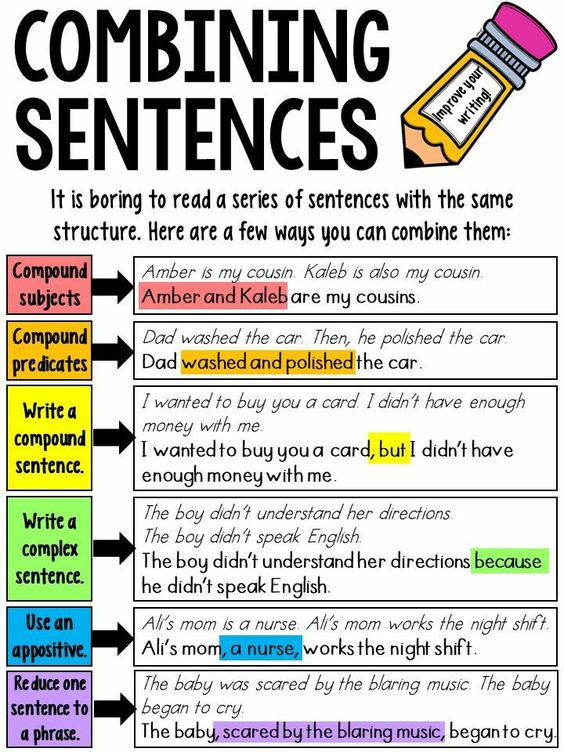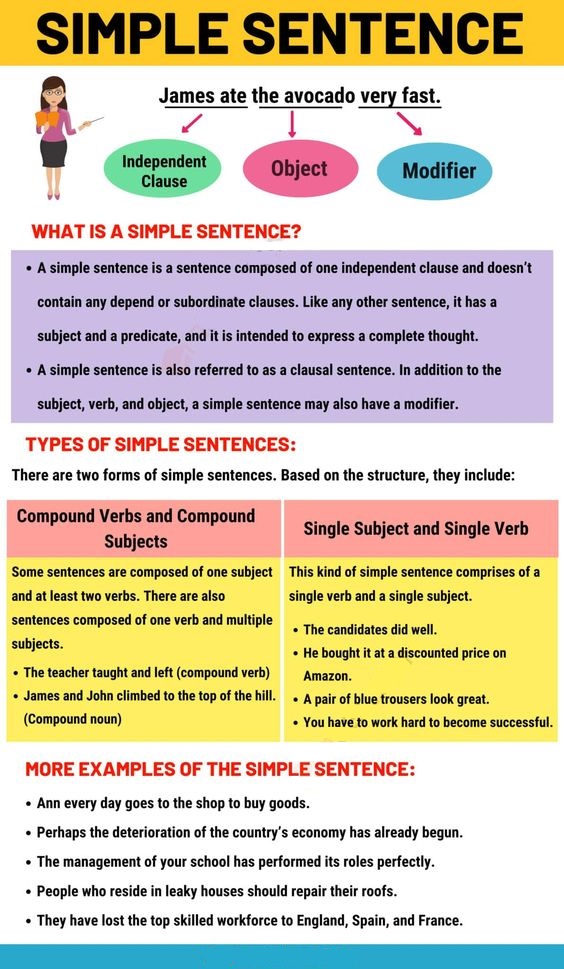Combination of Two or More Simple Sentences into A Single Simple Sentence
Two or more Simple Sentences can be combined into one Simple Sentence.
BY USING A PARTICIPLE
- He was tired of walking. He sat down to rest.
Tired (or being tired) of walking, he sat down to rest. - He failed in the examination. He gave up his studies.
Having failed in the examination, he gave up his studies. - I wished to see Mohan, I sent for him.
Wishing to see Mohan. I sent for him. - The policeman ran after the thief. The policeman caught him.
Running after the thief, the policeman caught him. - He selected a site. He began to build a house.
Having selected a site, he began to build a house.
Exercise 1: Combine each set of Simple Sentences into one Simple Sentence by using a Participle.
- He finished his dinner. He went out for a walk.
- He was tired. He sat down to rest.
- He felt sleepy. He went to bed.
- He raised his gun. He took aim.
- The magician took pity on the mouse. He turned it into a cat.
- A fox saw some grapes. They were hanging from a vine.
- The child found himself alone. He began to weep.
- He had his dinner. He began to do his homework.
- She received a telegram. She became very sad.
- She had a good rest. She felt much better.
- He is very ill. He cannot attend the meeting.
- He received no answer. He knocked a second time.
- He went to Delhi. He wished to consult a heart specialist.
- I have given you all the facts. I have nothing more to say.
- He earned the displeasure of his boss. He was dismissed from service.
BY USING AN ABSOLUTE PHRASE
- The police arrived. The mob dispersed.
The police having arrived, the mob dispersed. - The weather was fine. We went for a walk.
The weather being fine, we went for a walk. - The sun rose. The fog disappeared.
The sun having risen, the fog disappeared - The siege was over. The enemy withdrew.
The siege being over, the enemy withdrew. - The bank was closed. I could not withdrew any money.
The bank being closed, I could not withdraw any money.
Exercise 2: Combine each set of Simple Sentences into one Simple Sentence by using an Absolute Phrase.
- It was very late. I did not go out for a walk.
- The rain ceased. We began to play cricket again.
- The wind was favourable. The ship set sail.
- It was very hot. We could not sleep inside.
- The sun rose. The fog disappeared.
- The holidays are at an end. The boys are returning to school.
- Tf ; police arrived. The mob dispersed.
- It was a bank holiday. I could not withdraw any money.
- It was very late. They went to bed at once.
- Rain was plentiful this year. There was a rich crop.
- There was no money left. We had to borrow from our friends.
- It was extremely hot. We could not do any work.
- The lecture was over. The people streamed out of the hall.
- The master was away on business. The boys were in a merry mood. They made a noise.
- Our side was weak. The other side was strong. Our team lost the match by one goal.
BY USING A PREPOSITION WITH A NOUN OR A GERUND
- He has failed many times. He still hopes to succeed.
In spite of many failures, he hopes to succeed. - She amused the party. She told them many funny stories.
She amused the party by telling them many funny stories. - She gave us his advice. He helped us with money.
Besides giving us his advice he helped us with money. - He did not succeed. He had made every effort.
With all his efforts he did not succeed. - His mother died. He heard the news. He left at once.
On hearing the news of his mother’s death he left at once.
Exercise 3: Combine each set of Simple Sentences into one Simple sentence by using a Preposition with a Noun or a Gerund :—
- The sun set. Their journey was not ended.
- You helped us. Otherwise we would not have succeeded.
- He checked all the accounts. He found many serious errors in them.
- He failed in the examination. He heard the news. He began to weep.
- Her husband died suddenly. This gave her a rude shock. She never fully recovered from it.
- She has failed many times. She still hopes to succeed.
- He used to amuse us. He told us funny stories.
- He heard the news. He rode away at once.
- The boy realised his mistake. He grew very nervous.
- She found the ring at once. She did not search for it.
BY USING AN INFINITIVE
- I speak the truth. I am not afraid of it.
I am not afraid to speak the truth. - He has five children. He must provide for them.
He has five children to provide for. - Health is very important. It must not be neglected.
Health is too important to be neglected. - He is going to Pune. He will start business there.
He is going to Pune to start business there. - Your sister had not enough industry. She could not therefore win a prize.
Your sister had not enough industry to win a prize.
Exercise 4: Combine each set of Simple Sentences into one Simple Sentence by using an Infinitive.
- He is very honourable. He will not tell lies.
- He had no money with him. He could not afford such luxuries.
- I heard of her success. I was glad of that.
- He cannot afford a radio set. He is very poor.
- He is very intelligent. He cannot commit such mistakes.
- He works very hard. He wants to pass the examination.
- He has ten children. He must support them.
- He has some bills. He must pay them.
- He cannot afford a television set. He is too poor.
- Your parents will hear of your marriage. They will be delighted.
BY USING A NOUN OR A PHRASE IN APPOSITION
- Brown is my teacher. He lives at Rishikesh.
Mr. Brown, my teacher, lives at Rishikesh. - This is my younger sister. She is a great painter.
This is my younger sister, a great painter. - He slew all the prisoners. This was a very horrible act.
He slew all the prisoners—a very horrible act. - Milton was a blind poet. He wrote Paradise Lost. It is one of the finest epics in the English language.
Milton, a blind poet, wrote Paradise Lost—one of the finest epics English language.
Exercise 5: Combine each set of Simple Sentences into one Simple Sentence by using a Noun or a Phrase in Apposition
- Wellington won many battles. He was a great soldier.
- This speech was delivered by Abraham Lincoln. He was the President of the United States of America.
- The Taj Mahal was built by Shah Jahan. It is the finest mausoleum in the world.
- Gitanjaliwas written by Rabindranath Tagore. He was a great Indian poet.
- Smith is my friend. He is a great industrialist.
- Ranjeet is a good batsman. He made a hundred yesterday.
- My brother is a great painter. He has painted this picture.
- Mahatma Gandhi never told a lie. He is called ‘The Father of the Nation.”
- The pilgrims reached Hardwar. It is a sacred place of the Hindus.
- He jumped into the swollen river to save the child. It was a very brave act.
BY USING AN ADVERBS OR AN ADVERBIAL PHRASE
- The train is very crowded. That is usual.
The train is usually very crowded. - Beware of false friends. This is of first importance.
Above all things, beware of false friends. - The sun had set. He had not reached his home.
He had not reached his home by sunset. - He possesses a head for business. This is certain.
He certainly possesses a head for business.
Exercise 6: Combine each set of Simple Sentences into one Simple Sentence by using an Adverb or an Adverbial Phrase.
- He failed. It was unexpected.
- He neglected his studies. This was foolish.
- He forgot to bring the keys. That was unfortunate.
- He escaped unhurt. It was lucky.
- The sun set. The travellers had not returned.
- He is the best teacher. There is no doubt about it. (Use )
- The train is very late. That is usual.
- He is an undesirable fellow. This is certain.
- He persevered. He was not deterred by setbacks.
- He kicked the poor beggar. It was his intention to do so.
Several of the methods described above may be combined in the same sentence.
- I saw a woman. She was about thirty years of age. She stood at the Palace Gate for hours. She did not speak. She did not move. I saw a woman, about thirty years of age, standing at the Palace Gate for hours, without speaking or moving.
- The King was ill. The people heard the news. They crowded to the palace. They wished to inquire about his health. Having heard the news of the King’s illness, the people crowded to the palace to inquire about his health.
- He went to Delhi. Delhi is the capital of India. He went there during the Xmas holidays. His purpose was to see the historical buildings there.
During the Xmas holidays, he went to Delhi, the capital of India, to see the historical buildings there.
Exercise 7: Combine each of Simple Sentences into one Simple Sentence.
- The people saw the flames. They ran towards the burning house.
- The information cannot be of any use to us. It has come too late.
- The old woman was carrying a basket. It was filled with mangoes.
- He amused us very much. He told us a funny story.
- A crow was very thirsty. She flew to a pitcher. She hoped to find some water in it.
- The fakirheld a begging bowl. It was made of wood. He appealed to the charity of the passers, by.
- The doors were bolted. The windows were barred. The thieves failed to break into the house.
- My friend is going to Europe. He has got two years leave. He wishes to become a barrister.
- One day the Pope saw some children. His name was Gregory. The children were very fair. They were being sold as slaves in the market. He was very pained to see this.
- I must cut my story short. He squandered all his wealth. He had acquired it dishonestly. He died in poverty.
- The farmer heard the boy’s shouts. The boy was drowning. He at once plunged into the river. He risked his own life.
- I saw a woman. She was very beautiful. She was standing near the shrine. There were tears in her eyes.
- I was terrified to see a man. He was at a distance of about twenty metres from me. He was followed by blood-hounds. They were half a dozen in number. They looked like fierce lions.
- The sun set. The King wandered long in search of a deer. He lost his way in the jungle. At last he came upon a hut. It belonged to a poor farmer.
- He has read the He read it in Sanskrit. He read it at the age of fourteen. He himself told me this.

